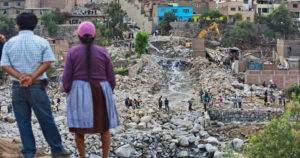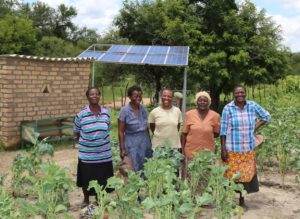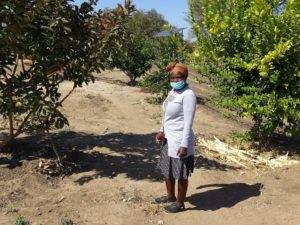Find out what climate action is and the different ways individuals and countries are taking positive steps to reduce their impact on the planet.
What is climate action?
Climate action is any activity taken with the intention of reducing or offsetting the damage people are doing to the planet.
Some climate action is focused on reducing the volume of heat-trapping greenhouse gases being released into the atmosphere. This can be done by either reducing the sources of these gases (such as the burning of fossil fuels for electricity, heat or transport) or improving the natural bodies that absorb them (such as the oceans, forests and soil). The overarching goal of climate action is to avoid significant human interference with the climate system, and stabilise greenhouse gas levels.
Climate adaptation is another sort of climate action. This involves people making changes to their lives so they can be successful in the new climate reality. For example, a farmer living in a drought-prone area might use solar-powered irrigation to make up for the less frequent rainfall.
Why is climate action important?

Climate change is continuing to make the effects of many natural hazards more extreme across the planet, and is affecting many millions of people around the world, in some of the most vulnerable communities.
Wildfires, droughts, flooding and other examples of extreme weather patterns affected 38 million people in 2018, according to the United Nations.
As the UN says, “The climate crisis continues unabated as the global community shies away from the full commitment required for its reversal. 2010-2019 was the warmest decade ever recorded, bringing with it massive wildfires, hurricanes, droughts, floods and other climate hazards across continents. Climate change is affecting every country in the world. It is disrupting national economies and affecting lives and livelihoods, especially for the most vulnerable.
There are many types of Climate Action, on an individual, human basis, across communities and across the world, whether influencing opinion or taking more practical and direct action in mitigation of the effects of climate change. We’ll discuss some of them here.
Global Action
The United Nations’ Sustainable Development Goals are a call for action by all countries to promote prosperity while protecting the planet. Sustainable Development Goal 13, calls for urgent action to combat climate change and its impacts.
As set out by the UN, Sustainable Development Goal 13 has 5 targets. To,
- Strengthen resilience and adaptive capacity to climate-related hazards and natural hazards in all countries,
- Integrate climate change measures into national policies, strategies and planning,
- Improve education, awareness-raising and human and institutional capacity on climate change mitigation, adaptation, impact reduction and early warning,
- Implement the commitment undertaken by developed-country parties to the United Nations Framework Convention on Climate Change (UNFCCC) to a goal of mobilising jointly $100 billion annually by 2020 from all sources, to address the needs of developing countries in the context of meaningful mitigation actions and transparency on implementation and fully operationalise the Green Climate Fund through its capitalisation as soon as possible,
- Promote mechanisms for raising capacity for effective climate change-related planning and management in least developed countries and small island developing States, including focusing on women, youth and local and marginalised communities.
Mass action
 A powerful example of mass action has been seen in a number of cities across the world by groups such as Extinction Rebellion. Their first action was in October 2018, in Parliament Square in London when they announced a ‘Declaration of Rebellion against the UK Government’.
A powerful example of mass action has been seen in a number of cities across the world by groups such as Extinction Rebellion. Their first action was in October 2018, in Parliament Square in London when they announced a ‘Declaration of Rebellion against the UK Government’.
As they write, following that initial action, “the next few weeks were a whirlwind. Six thousand of us converged on London to peacefully block five major bridges across the Thames. We planted trees in the middle of Parliament Square, and dug a hole there to bury a coffin representing our future. We super-glued ourselves to the gates of Buckingham Palace as we read a letter to the Queen.”
The group say that Extinction Rebellion is a politically non-partisan international movement that uses non-violent direct action to persuade governments to act justly on the Climate and Ecological Emergency.
“We are facing an unprecedented global emergency. Life on Earth is in crisis: scientists agree we have entered a period of abrupt climate breakdown, and we are in the midst of a mass extinction of our own making.”
Their actions have generated huge national and international publicity and certainly got people talking. In their publicity they have three demands in the UK:
- Tell the Truth – Government must tell the truth by declaring a climate and ecological emergency, working with other institutions to communicate the urgency for change.
- Act Now – Government must act now to halt biodiversity loss and reduce greenhouse gas emissions to net zero by 2025.
- Go Beyond Politics – Government must create and be led by the decisions of a Citizens’ Assembly on climate and ecological justice.
Direct Action
Other campaigning groups and charities have decided to take direct action to highlight their campaigns. Greenpeace is a leading example, originating in Vancouver, Canada in the 1970s, when they initially protested against nuclear testing in the Pacific Ocean and then later raised awareness about the plight of whales by manoeuvring small boats between the animals and their whaling hunters.
As part of their climate emergency campaigning, Greenpeace have occupied a North Sea Oil Rig aiming to stop a new well being drilled in the North Sea, taken action against Burger Firms who buy meat from cleared areas of the Amazon rain forest and invaded an oil company’s Annual General Meeting alerting shareholders to drilling plans near the Amazon Reef off the coast o Brazil.
Community action
![]()
![]()
 There are many positive examples of Climate Action on a community level as well.
There are many positive examples of Climate Action on a community level as well.
One recent one focusses on the city of Chester in the north-west of England where restaurants and other businesses are eradicating deforestation-linked oil from their supply chains, increasing awareness both locally and nationally.
They have declared themselves to be the world’s ‘first sustainable palm oil city’, and over 50 organisations including Chester Zoo, restaurants, a Welsh fudge producer and an animal food provider are working together to adapt their supply chains with the goal of removing all products containing non-RSPO (Roundtable on Sustainable Palm Oil) certified palm oil.
Individual action
There are many things that individuals can do on a human level, whether in changing aspects of their lifestyles or in influencing others.
Greta Thunberg is an individual who has had a profound impact in influencing people, organisations and governments. As she says on a recent tweet, “When enough people come together then change will come and we can achieve almost anything. So instead of looking for hope – start creating it”.
We can all make many adaptations to our daily lives and we can all think more about how we can be more sustainable and become climate pioneers.
So many of the products we use daily contain materials that are in scarce supply and are non-renewable. We can all make positive choices that will make a difference.
The United Nations have a campaign for individual action on climate change and sustainability, stating that the transition to a low-carbon world also requires the participation of citizens. Called ActNow, they say that, “every one of us can help take care of our planet. By making choices that have less harmful effects on the environment, we can be part of the solution and influence change”. At the end of 2021, the UN report that through their phone app and #ActNow website, 4,624,956 climate actions have been taken around the world as part of this campaign.
Practical Action
At Practical Action we believe in the power of small to create big change. And that when we collaborate and pool skills and knowledge, we can be more optimistic that it’s possible to create a world that’s better for everyone.
We know we can take Climate Action together, to create real change.

